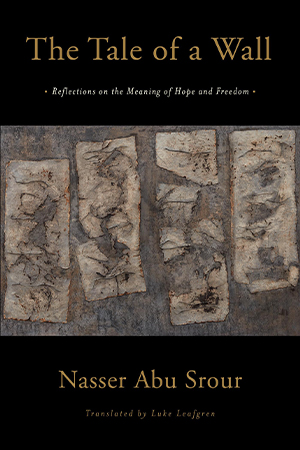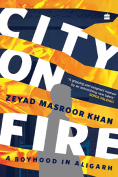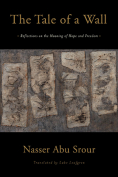The Tale of a Wall: Reflections on the Meaning of Hope by Nasser Abu Srour
 New York. Other Press. 2024. 320 pages.
New York. Other Press. 2024. 320 pages.
Among the nearly ten thousand Palestinians jailed in Israeli prisons, the poet Nasser Abu Srour has remained behind bars since 1993. In the last year of the First Intifada, Srour allegedly acted as an accomplice to his cousin in the murder of a Shin Bet intelligence officer. At twenty-three, he first met the bare, unforgiving slate of wall that would inspire him to write what has become his debut in English, translated from Arabic with visceral poise by Luke Leafgren.
In the over thirty years that he has languished under Israel’s skewed order of justice as meted to stateless Palestinians, Srour has taken refuge in the written word, conveying a certain philosophical and literary refuge that, however indignant, expresses an air of desperation before the tragedies of his lost youth and the overarching political futilities of his struggle.
When read for universal appeal, The Tale of a Wall is a powerful evocation of existentialism in the twenty-first century. Born of postcolonial critique vis-à-vis the multigenerational victimization of French Africa and its cries falling on the empathic ears of Parisian culturati, Srour denudes political empowerment to the core of the human condition. Despite all that would erase him, and in the face of self-destructive tendencies as an individual and as the representative of a divided nation scrambling for recognition and leadership, he exists.
Srour stands firm in the cause of proclaiming his selfhood in each of his affecting lines of astute, riveting prose and verse that, welcomingly, transform his romantic, literary talents beyond political agitprop toward an authentic artistry that exemplifies his freedom of mind. Reflecting on his initial incarceration in Hebron at the age of twenty-three, Srour writes: “The journey begins by letting go of everything you once believed: you, who have worn a thousand ‘I’s. . . . I was like every other Palestinian aware of their bondage, who had to lose their freedom in order to be free, who had to die in order to live.”
After peeling back layers of his authorial subjectivity, Srour introduces the reader to the effect of the wall itself, what that bare expanse of stone meant for him, as a man who had let go of the world and submitted himself to the psychological interiority of indefinite confinement under the whim of his people’s common oppressor, what he calls the “Occupying State.” The Tale of a Wall does not begin like a political rallying cry, demonizing Israel while painting a caricature of Palestinian victimhood. Instead, this thoughtful book is an introspective treatment of one man’s confrontation with the roots of his identity, surrendering all concepts of reflection to the stark definition of his body up against a wall.
The emptiness that he details in so many words is the fruit of his inspiration. As a writer, or more specifically here a memoirist, the wall is his blank page, the essential seed of creativity.
Throughout all the years of a confinement that kept moving as though life depended upon it, the wall remained my single point of stability. I made it my stable point of reference, by which I calculated the location, speed, and distance of every element around me. And no, I did not become the center of that universe. Instead, I found my place within it.
At times, especially when in solitary (there is an entire chapter detailing his experience), the wall becomes Srour’s sole companion with whom to reflect on his dialectics of reason. While immersed in The Tale of a Wall, a reader may feel they are together in the cell with Srour, discussing Kant and Kierkegaard with a surface that, even if apparently unmoving, retains a kind of animate, personal wisdom in its sheer presence and by virtue of mirroring his thoughts.
Inevitably, if appropriately, Srour addresses the passion of liberation that Palestinians have borne, crucified as it were, for existing at all between the vise of statelessness and dehumanization that damns Western civilization in its outstanding postcolonial hypocrisies. As the fifth of eight children raised between 1948 and 1967, both of which are termed as catastrophes or nakba in Arabic—when, respectively, Israel gained territorial independence and subsequently occupied the West Bank and Gaza Strip—he vocalizes his part in the resistance when he stood as one of the Generation of Stones: “A generation that only a day before was hanging from the barriers of its camp, full of doubt, now became master of the place and author of the story.”
Clear-eyed in his remembrances of family life, Srour watched as Israel’s Occupation emasculated his father and compelled his mother to become their breadwinner, upending the traditions of their home. And it was by testing the flexibility of their domestic survivalism where Srour first spread his wings as a rebel against the system that summarily stifled and grounded his youthful abandon. Beyond their stuffy concrete house, growing up in a refugee camp in Bethlehem offered little in the way of a future. Confronting a vacuum of nothingness before that first of many walls he faced during childhood, Srour raised himself up by the depth of his questions.
What did that place on the other side of the wall fear from a boy afflicted by an inordinate degree of God-given curiosity? Or from a mother who indulged his imagination? From a youth who came before its time? Or a camp that was strangling its inhabitants?
When paired with a more sober reflection of the Palestinian-Israeli conflict by such figures as West Bank lawyer Raja Shehadeh, Srour’s recourse to poetry, interspersed within his chronicle of embattled petitioning for statehood and sovereignty, is more a plea for emotional solidarity than historiographic accuracy or an exercise in mere reason. Shehadeh’s latest book, What Does Israel Fear from Palestine?, seeks to clarify quandaries that Srour interrogates in his self-sacrificing pursuit of justice. Whether in verse or prose, he is alone with himself, but not in the world. On the other side of the wall, others listen and respond.
The final act of The Tale of a Wall is a love story, unhappy but true.
Matt A. Hanson
Istanbul































